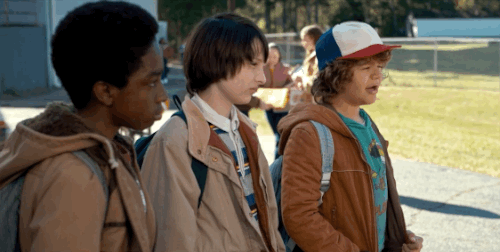Suffering from cleidocranial dysplasia, a rare genetic condition, caused him to lose many opportunities on TV until the perfect role came along...

Gaten Matarazzo suffered when he found out about the disorder that deforms his body. The actor from "Stranger Things " lost many opportunities on TV because of his unusual genetic disorder. But for the producers at Netflix... his condition was the perfect feature.

"Then I realized that I love singing and acting, and it's really cool that I get to do both in this, at the same time. "
"CCD is short for cleidocranial dysplasia, and it's a genetic bone condition that affects pretty much every bone in your body if you have it. Primarily the collarbones and the jaw, which affects facial growth, and skull growth and everything. That's why my teeth are all messed up. It affects my knees as well, like, my legs, they go out that way for some reason, it's odd. "
Gaten suffers from cleidocranial dysplasia, a rare genetic condition. That's why his baby teeth had to be extracted when he was 11 and he's receiving treatment so his permanent teeth can come in.

Despite his great talent, he has lost many roles because of this condition...
"Definitely. That's one of the biggest reasons why I haven't been getting roles, because of my lisp that affected pretty much everything. I would go three times a week up for auditions, all the time and it's no, constant no. But the people that work with me, they said, 'Just wait. It'll happen.' "
It seemed impossible for Gaten to have a career on TV... Until the producers of 'Stanger Things' met him, and knew they had found something special.

"It started out when I was stretching in the audition room. I was stretching like this, and they were like,' Wait, what did you just do?' "
They knew right away that they had found the Dustin.
"The Duffer brothers, the directors of the show, was they wanted to make sure that each character in the show was unique and they had something that was realistic and personal. "
They even decided to add the disorder to the show.

"I told you a million times, my teeth are coming in. It's called cleidocranial dysplasia. "
Now, Gaten works with an organization dedicated to raising awareness about the disorder and help people whose health insurance doesn't cover the treatment.
"But I think it's important, ' cause I have a very mild case of it, and most people who aren't familiar with it would not know that I have it. A lot of people have it a lot harder than I do. A lot of people have to wear, especially when they are younger, a lot of people have to wear full-on braces on their body to keep their backs up straight. "






0 Commentaires